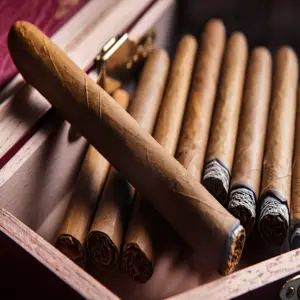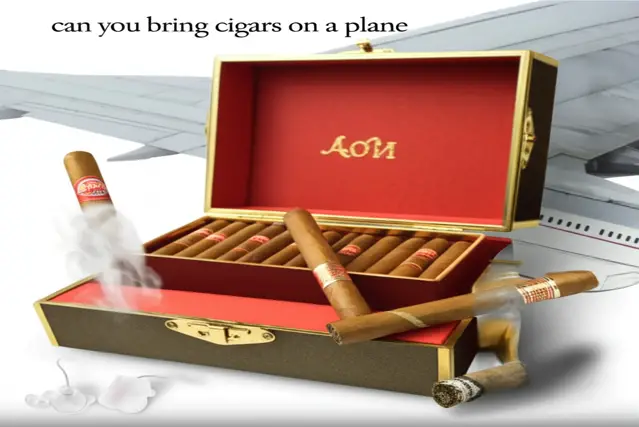Planning a trip and wondering if you can bring your beloved cigars along for the ride? Whether you’re a seasoned aficionado or a casual smoker, navigating the rules and regulations surrounding cigars on airplanes can be tricky. In this comprehensive guide, we’ll break down everything you need to know about traveling with cigars in 2025, ensuring you arrive at your destination ready to enjoy your favorite smokes without any hiccups.
From TSA guidelines and international regulations to tips on packing and storing your cigars, we’ve got you covered. We’ll also address common concerns and frequently asked questions to provide you with the most up-to-date and accurate information. So, sit back, relax, and let’s dive into the world of cigar travel!
Table of Contents
Understanding the Basics: TSA and Cigars
The Transportation Security Administration (TSA) is the primary authority when it comes to what you can and cannot bring on a plane within the United States. Fortunately for cigar lovers, the TSA’s stance on cigars is generally quite lenient. However, it’s crucial to understand the nuances to avoid any potential delays or complications at security checkpoints.
TSA Guidelines: Cigars in Carry-On Luggage
The good news is that you can bring cigars in your carry-on luggage. The TSA does not explicitly prohibit cigars, and they are generally treated like any other personal item. This means you can pack your cigars in your carry-on bag without any major concerns.

However, there are a few points to keep in mind:
- Quantity: While the TSA doesn’t typically limit the number of cigars you can bring, excessive amounts might raise eyebrows. It’s always a good idea to pack a reasonable quantity for personal use.
- Packaging: Your cigars should be properly packaged to protect them from damage during transit. A sturdy cigar case or humidor is recommended.
- Lighters and Cutters: The rules regarding lighters and cutters are more specific and vary depending on the type. We’ll delve into this in more detail later.
TSA Guidelines: Cigars in Checked Luggage
Similar to carry-on luggage, you can also pack cigars in your checked luggage. This might be a preferred option if you’re bringing a larger quantity of cigars or if you want to keep your carry-on bag lighter. Here are some considerations for packing cigars in checked luggage:

travel cigars
- Protection: Checked luggage can be subject to rough handling, so it’s even more important to protect your cigars with a robust case or humidor.
- Humidity: Changes in temperature and pressure in the cargo hold can affect the humidity levels surrounding your cigars. Consider using a humidification device to maintain optimal conditions.
- Security: While rare, there’s always a slight risk of theft or damage to checked luggage. Insuring your valuable cigars might be a worthwhile precaution.
What the TSA Website Says
The TSA website is the most reliable source of information regarding prohibited items. While the website doesn’t have a specific entry for “cigars,” it’s important to consult the general guidelines for tobacco products and related items. You can typically find this information under the “What Can I Bring?” section and search for “tobacco” or “lighters.”
It’s highly recommended to check the TSA website before your trip to ensure you have the most up-to-date information.
Navigating Lighters and Cutters: A Smoker’s Dilemma
While cigars themselves are generally allowed, the rules surrounding lighters and cutters can be a bit more complex. Understanding these regulations is crucial to avoid confiscation or delays at security checkpoints.
Lighters: What’s Allowed and What’s Not
The TSA has specific guidelines regarding the types of lighters that are permitted on airplanes. These rules are primarily based on safety concerns related to flammable liquids and ignition sources.
- Torch Lighters (Butane): Torch lighters, also known as butane lighters, are generally prohibited in both carry-on and checked luggage. These lighters produce a high-intensity flame and are considered a fire hazard.
- Soft Flame Lighters (Butane or Fluid): Soft flame lighters, such as Zippos, are permitted in carry-on luggage but are prohibited in checked luggage. If you’re bringing a soft flame lighter, it must be carried on your person.
- Electric Lighters (Arc Lighters): Electric lighters, also known as arc lighters or plasma lighters, are generally permitted in carry-on luggage. However, it’s always a good idea to check with the specific airline, as their policies may vary.
- Disposable Lighters (Butane): Standard disposable lighters, like BICs, are permitted in carry-on luggage but are prohibited in checked luggage.
It is very important to empty the fuel of your lighters before traveling. Even if the TSA allows it, airlines might have stricter regulations.
Table: TSA Lighter Regulations (2025)
| Lighter Type | Carry-On Luggage | Checked Luggage |
|---|---|---|
| Torch Lighters (Butane) | Prohibited | Prohibited |
| Soft Flame Lighters (Butane or Fluid) | Permitted (on person) | Prohibited |
| Electric Lighters (Arc Lighters) | Permitted (Check with Airline) | Permitted (Check with Airline) |
| Disposable Lighters (Butane) | Permitted (on person) | Prohibited |
Cigar Cutters: Blades and Safety
Cigar cutters, like lighters, are subject to certain restrictions based on the presence of blades. The TSA’s primary concern is the potential for sharp objects to be used as weapons.
- Guillotine Cutters: Guillotine cutters, which have a single blade, are generally permitted in both carry-on and checked luggage, provided the blade is less than 4 inches in length.
- Scissors: Scissors with blades shorter than 4 inches are allowed in carry-on baggage. Those with longer blades must go in your checked baggage.
- Punch Cutters: Punch cutters, which create a small hole in the cigar head, are typically permitted in both carry-on and checked luggage due to their small size and lack of a sharp blade.
- V-Cutters: V-cutters, which create a V-shaped notch in the cigar head, are also generally permitted in both carry-on and checked luggage, provided the blade is less than 4 inches.
If you’re unsure about the blade length of your cutter, it’s always best to pack it in your checked luggage to avoid any potential issues.
Real-World Example: Airport Anecdotes
Many cigar enthusiasts have shared their experiences with lighters and cutters at airport security. One common scenario involves travelers attempting to bring torch lighters in their carry-on bags, only to have them confiscated by TSA agents. Another frequent occurrence is travelers forgetting to remove lighters from their checked luggage, resulting in their bags being flagged for inspection.
To avoid these situations, it’s crucial to double-check your bags before heading to the airport and to familiarize yourself with the TSA’s guidelines. Consider purchasing a travel-friendly electric lighter or a small punch cutter for your trips.
Read More: Can You Put Carbonated Beverages In Checked Luggage?
International Travel: Navigating Global Cigar Regulations
Traveling internationally with cigars adds another layer of complexity to the equation. Each country has its own set of regulations regarding tobacco products, and it’s essential to be aware of these rules to avoid fines, confiscation, or even legal trouble.
Researching Destination-Specific Regulations
The most important step in preparing for international cigar travel is to research the specific regulations of your destination country. This information can typically be found on the country’s customs website, embassy website, or through travel advisories. Key aspects to investigate include:
- Import Limits: Many countries have limits on the number of cigars you can bring into the country without paying import duties. These limits can vary widely, from a few cigars to several boxes.
- Declaration Requirements: Some countries require you to declare any tobacco products you’re bringing into the country, regardless of the quantity. Failure to declare can result in penalties.
- Prohibited Items: Certain countries may have specific prohibitions on certain types of tobacco products or related items, such as lighters or humidification devices.
Always err on the side of caution and declare your cigars, even if you’re unsure about the regulations. It’s better to be safe than sorry.
Examples of International Cigar Regulations
To illustrate the diversity of international cigar regulations, let’s look at a few examples:
- European Union (EU): The EU generally allows travelers to bring in a reasonable quantity of cigars for personal use. However, individual member states may have their own specific regulations and limits.
- Canada: Canada has strict regulations on tobacco products, including cigars. Travelers are typically allowed to bring in a limited quantity for personal use, but they must declare the cigars and pay applicable duties.
- Cuba: Cuba, known for its premium cigars, has its own set of regulations for exporting cigars. Travelers are typically allowed to take a certain number of cigars out of the country, but they must be purchased from authorized retailers.
- Singapore: Singapore has very strict laws regarding tobacco. Importing more than a very small amount of tobacco products requires permits.
Dealing with Customs and Duty Fees
When arriving at your international destination, you’ll likely need to go through customs. If you’re carrying cigars, be prepared to answer questions from customs officials and to potentially pay duty fees. Here are some tips for dealing with customs:
- Declare Your Cigars: Be honest and upfront about the cigars you’re carrying. Declare them on your customs form and be prepared to answer questions about their quantity and value.
- Have Receipts Ready: If you purchased the cigars recently, have your receipts readily available to prove their value. This can help customs officials determine the appropriate duty fees.
- Pay Duty Fees: If required, be prepared to pay the applicable duty fees. The fees can vary depending on the country, the quantity of cigars, and their value.
- Be Respectful: Treat customs officials with respect and answer their questions honestly. A courteous and cooperative attitude can go a long way in ensuring a smooth customs experience.
Table: Examples of International Cigar Import Regulations (Subject to Change)
| Country | Import Limit (Personal Use) | Declaration Required | Notes |
|---|---|---|---|
| European Union (EU) | Varies by Member State (Usually 50 cigars) | Yes | Check specific country regulations. |
| Canada | 200 Cigarettes, 50 Cigars, 200 grams of manufactured tobacco. | Yes | Duties and taxes apply. |
| Cuba | 50 cigars (for export) | Yes | Must be purchased from authorized retailers. |
| Singapore | Requires permits for all tobacco products | Yes | Severe penalties for violations. |
Note: These regulations are subject to change. Always verify the latest information with the relevant authorities before your trip.
Packing and Storing Cigars for Travel
Proper packing and storage are essential for keeping your cigars fresh and protected during travel. Changes in temperature, humidity, and pressure can significantly impact the quality of your cigars. Therefore, it’s crucial to take the necessary precautions to maintain their optimal condition.
Choosing the Right Cigar Case or Humidor
The first step in packing your cigars is to choose the right case or humidor. There are several options available, each with its own advantages and disadvantages:
- Travel Humidors: Travel humidors are specifically designed for transporting cigars. They are typically made of durable materials, such as plastic or metal, and feature a tight seal to maintain humidity levels. Many travel humidors also include a humidification device.
- Cigar Cases: Cigar cases come in a variety of sizes and materials, including leather, wood, and metal. They provide protection against physical damage but may not offer adequate humidity control for extended travel.
- Tupperware Containers: For shorter trips, a simple Tupperware container can be an effective way to protect your cigars. Line the container with a cedar sheet or a humidification packet to maintain humidity levels.
Invest in a high-quality travel humidor if you frequently travel with cigars. It’s a worthwhile investment that will protect your precious smokes.
Maintaining Humidity During Travel
Maintaining adequate humidity is crucial for preventing your cigars from drying out or becoming damaged. Here are some tips for maintaining humidity during travel:
- Humidification Devices: Use a humidification device, such as a Boveda pack or a water pillow, to maintain humidity levels inside your cigar case or humidor. These devices release moisture gradually, keeping your cigars at the optimal humidity level.
- Cedar Lining: Cedar wood helps to regulate humidity and impart a pleasant aroma to your cigars. Line your cigar case or humidor with cedar sheets or use a cedar divider.
- Seal the Container: Ensure that your cigar case or humidor is tightly sealed to prevent moisture from escaping. Check the seal regularly to make sure it’s intact.
Protecting Cigars from Physical Damage
In addition to humidity, it’s also important to protect your cigars from physical damage during travel. Here are some tips for preventing damage:
- Pack Carefully: Arrange your cigars carefully inside your case or humidor to prevent them from shifting or rubbing against each other.
- Use Padding: Add padding, such as foam or bubble wrap, to protect your cigars from impact.
- Secure the Case: Secure your cigar case or humidor inside your luggage to prevent it from moving around during transit.
Preparing Your Cigars Before You Leave
Before you pack your cigars for travel, take some time to prepare them properly. Here are some tips:
- Humidify in Advance: If your cigars have been stored in a dry environment, humidify them for several days before your trip to ensure they’re at the optimal moisture level.
- Inspect for Damage: Check your cigars for any signs of damage, such as cracks or tears. Avoid packing damaged cigars, as they’re more likely to deteriorate during travel.
- Consider a Hygrometer: If you’re using a travel humidor, consider including a small hygrometer to monitor the humidity level inside the case. This will allow you to make adjustments as needed.
Smoking on the Plane and at the Airport: A Big No-No
In today’s world, smoking on airplanes and in most areas of airports is strictly prohibited. This is due to a combination of factors, including health concerns, fire safety, and the comfort of other passengers.
The Ban on Smoking During Flights
Smoking has been banned on virtually all commercial flights worldwide for many years. This ban applies to all types of tobacco products, including cigars, cigarettes, and e-cigarettes. Violating the smoking ban can result in hefty fines and even legal consequences.
Do not attempt to smoke on an airplane, regardless of how discreet you think you can be. The risks are simply not worth it.
Smoking Areas at Airports: A Diminishing Sight
While smoking was once permitted in designated areas of airports, these areas are becoming increasingly rare. Many airports have banned smoking altogether, while others offer only limited outdoor smoking areas.
Before your trip, check the airport’s website or contact customer service to determine if smoking areas are available. Be prepared to walk a considerable distance to reach these areas, as they are often located outside the terminal.
Alternatives to Smoking During Travel
If you’re a cigar smoker who finds it difficult to abstain from smoking during travel, here are some alternative strategies you can consider:
- Nicotine Replacement Therapy: Nicotine patches, gum, or lozenges can help to curb your cravings during long flights or layovers.
- Distraction Techniques: Engage in activities that distract you from your cravings, such as reading, watching movies, or listening to music.
- Plan Your Smoke Breaks: If possible, plan your travel itinerary to allow for smoke breaks at airports with designated smoking areas.
Read More: Wax On A Plane? Know The Rules
Current Trends in Cigar Travel
The world of cigar travel is constantly evolving, with new trends and developments emerging all the time. Staying up-to-date on these trends can help you to navigate the complexities of cigar travel and to make the most of your smoking experiences.
The Rise of Travel Humidors
Travel humidors have become increasingly popular among cigar enthusiasts in recent years. These specialized cases offer a convenient and effective way to protect your cigars during travel. As demand for travel humidors has grown, manufacturers have responded with a wider variety of models, featuring advanced features such as built-in hygrometers and humidification systems.
The Growing Popularity of Electric Lighters
Electric lighters, also known as arc lighters or plasma lighters, have gained popularity as a travel-friendly alternative to traditional butane lighters. These lighters are typically permitted in carry-on luggage and do not require fuel, making them a convenient option for travelers.
The Increase in Cigar Lounges at Airports
While smoking areas at airports are becoming increasingly rare, some airports are opening cigar lounges to cater to cigar smokers. These lounges offer a comfortable and convenient place to enjoy a cigar before or after your flight. However, these are still uncommon. Consider searching ***cigar lounges near me*** upon arrival at your destination.
The Impact of E-Cigarette Regulations on Cigar Travel
The increasing regulation of e-cigarettes has had a ripple effect on cigar travel. Many of the same restrictions that apply to e-cigarettes, such as bans on smoking during flights and in public places, also apply to cigars. This has made it more challenging for cigar smokers to enjoy their hobby while traveling.
Statistics and Data on Cigar Consumption and Travel
Understanding the statistics and data surrounding cigar consumption and travel can provide valuable insights into the trends and patterns of the cigar industry. This information can help you to make informed decisions about your cigar travel plans.
Cigar Sales Trends
Cigar sales have been on the rise in recent years, driven by factors such as increased disposable income, a growing interest in premium cigars, and the relaxation of certain regulations. According to data from the Cigar Association of America, cigar sales in the United States have increased steadily over the past decade.
Travel Habits of Cigar Smokers
Cigar smokers are more likely than the general population to travel for leisure and business. They often seek out destinations with a vibrant cigar culture, such as Cuba, the Dominican Republic, and Nicaragua. They also tend to spend more money on travel and accommodations.
Demographics of Cigar Smokers
Cigar smokers are a diverse group, but they tend to be older, wealthier, and more educated than the general population. They are also more likely to be male and to hold professional or managerial positions.
The Economic Impact of Cigar Tourism
Cigar tourism has a significant economic impact on many countries, particularly those with a strong cigar industry. Cigar tourists spend money on accommodations, food, transportation, and cigars, contributing to local economies.
Troubleshooting Common Issues
Even with careful planning, unexpected issues can arise during cigar travel. Here are some tips for troubleshooting common problems:
Dealing with Confiscated Lighters or Cutters
If your lighter or cutter is confiscated by TSA agents, don’t panic. Remain calm and polite, and ask for clarification about the reason for the confiscation. If you believe the confiscation was unwarranted, you can file a complaint with the TSA. However, it’s generally best to accept the confiscation and move on.
Addressing Humidity Issues
If your cigars become too dry or too moist during travel, take steps to restore them to their optimal humidity level. If they’re too dry, place them in a humidified environment for several days. If they’re too moist, allow them to air out in a cool, dry place.
Handling Damaged Cigars
If your cigars become damaged during travel, assess the extent of the damage. Minor damage, such as small cracks or tears, may not significantly affect the smoking experience. However, more significant damage, such as crushed or broken cigars, may render them unsmokable. In this case, it’s best to discard the damaged cigars.

cigar transportation
Navigating Language Barriers
When traveling internationally, language barriers can sometimes pose a challenge. Learn a few basic phrases in the local language, such as “thank you,” “please,” and “do you speak English?” Use a translation app or phrasebook to communicate more effectively. Be patient and respectful, and try to find someone who can assist you.
Ethical Considerations for Cigar Travelers
As a cigar traveler, it’s important to be mindful of ethical considerations, such as environmental impact and social responsibility.
Environmental Impact of Cigar Production
Cigar production can have a significant environmental impact, particularly in terms of deforestation and pesticide use. Support sustainable cigar brands that prioritize environmental protection and responsible farming practices.
Social Responsibility in the Cigar Industry
The cigar industry has a history of labor exploitation and unfair wages. Support cigar brands that treat their workers fairly and provide them with safe working conditions.
Respecting Local Customs and Regulations
When traveling with cigars, be respectful of local customs and regulations. Avoid smoking in areas where it is prohibited, and dispose of your cigar butts responsibly.
Resources for Cigar Travelers
There are numerous resources available to help you plan your cigar travel adventures.
Cigar Associations and Organizations
Cigar associations and organizations, such as the Cigar Association of America and the International Premium Cigar & Pipe Retailers Association, provide valuable information and resources for cigar smokers.
Online Cigar Forums and Communities
Online cigar forums and communities, such as Cigar Aficionado and Reddit’s r/cigars, offer a place for cigar smokers to connect, share information, and ask questions.

flying with cigars
Travel Blogs and Websites
Travel blogs and websites dedicated to cigar travel provide valuable tips and insights for planning your trips.
FAQ: Your Burning Questions Answered
1. Can I bring a box of cigars on a plane in my carry-on?
Yes, you can typically bring a box of cigars in your carry-on luggage. The TSA does not generally limit the number of cigars you can bring, but it’s always a good idea to pack a reasonable quantity for personal use. Ensure your cigars are properly protected in a case or travel humidor.
2. What happens if I forget and leave a torch lighter in my checked luggage?
If you leave a torch lighter in your checked luggage, it will likely be detected during the screening process. Your bag may be flagged for inspection, and the lighter will be confiscated. You might also face a warning or a fine, depending on the circumstances.
3. Are there any countries where it’s illegal to bring cigars?
While it’s rare for a country to completely ban cigars, some countries have extremely strict regulations and high import duties. Singapore, for instance, requires permits for all tobacco products. Always research your destination’s specific regulations before traveling.
4. Can I smoke a cigar in the airport if I’m stuck on a long layover?
Smoking areas in airports are becoming increasingly rare. Check the airport’s website or contact customer service to determine if smoking areas are available. If there are no designated smoking areas, you will not be able to smoke a cigar in the airport.
5. How can I keep my cigars from drying out on a long flight?
To keep your cigars from drying out on a long flight, use a travel humidor or a cigar case with a humidification device, such as a Boveda pack. Ensure the case is tightly sealed and pack your cigars carefully to prevent damage.
6. What’s the best type of cigar cutter to bring on a plane?
Punch cutters are generally the safest and most convenient type of cigar cutter to bring on a plane, as they don’t have a sharp blade. Guillotine cutters and V-cutters are also permitted, provided the blade is less than 4 inches in length.
7. Do I need to declare my cigars at customs if I’m only bringing a few for personal use?
It’s always best to declare your cigars at customs, even if you’re only bringing a few for personal use. Some countries require you to declare any tobacco products, regardless of the quantity. Failure to declare can result in penalties.
8. Can I bring Cuban cigars back to the United States?
As of 2016, U.S. citizens are allowed to bring Cuban cigars back to the United States for personal use. There are limits on the value of goods that can be imported, and the cigars must be for personal consumption only, not for resale.
9. What’s the difference between a soft flame lighter and a torch lighter?
A soft flame lighter produces a traditional flame, similar to a Zippo. A torch lighter produces a high-intensity, focused flame that is often used for lighting cigars. Torch lighters are generally prohibited in both carry-on and checked luggage, while soft flame lighters are permitted in carry-on luggage but prohibited in checked luggage.
10. How do I file a complaint with the TSA if I feel my rights were violated?
You can file a complaint with the TSA online through their website or by contacting their customer service department. Be prepared to provide details about the incident, including the date, time, location, and the names of any TSA agents involved.
Conclusion: Final Thoughts on Traveling with Cigars
Traveling with cigars can seem daunting at first, but with the right knowledge and preparation, it can be a smooth and enjoyable experience. The key is to stay informed about the latest TSA guidelines and international regulations, pack your cigars carefully, and be respectful of local customs. By following the tips and advice in this guide, you can confidently bring your favorite smokes along on your next adventure.
Remember that regulations can change, so it’s always a good idea to double-check the TSA website and the customs website of your destination country before you travel. Being proactive and informed can save you time, money, and unnecessary stress. Whether you’re jetting off to a tropical paradise or embarking on a business trip, you can enjoy your cigars responsibly and without any major hassles.
The joy of enjoying a fine cigar is often enhanced by the experience of travel, whether it’s savoring a smoke in a new and exciting location or simply relaxing with a familiar blend after a long day of meetings. By taking the necessary precautions and being mindful of the rules, you can ensure that your cigar travel experiences are positive and memorable. So, pack your travel humidor, grab your favorite lighter (the TSA-approved kind, of course!), and get ready to embark on your next cigar-filled adventure. Happy travels and happy smoking!






